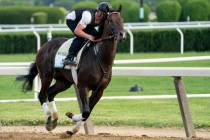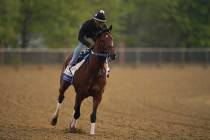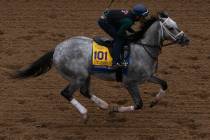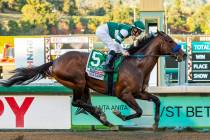Hitting finish line with much of horse racing story untold
I’ve read many a retirement column over my more than four decades in the news business, but I’ve never written one until now.
Friday is my last day at the Review-Journal, a milestone that saddens, frightens and delights me at the same time.
I’m going to miss my colleagues, I know that much. And it’s bound to take a couple of months of sheer idleness to break free of the frenetic rhythms that have shaped my days at the Hayward Daily Review, the San Francisco Examiner, msnbc.com and the Review-Journal into a career.
But perhaps my biggest regret is that I’m stepping away from a story I care deeply about, long before it’s done.
Horse racing remains mired in an existential crisis of its own making for too many reasons to go into here. And as a fan since a college newspaper editor dispatched me to Golden Gate Fields in the mid-1970s to write a “feature about the ponies,” I relished the opportunity to present a more nuanced view of the sport than the haters would have liked.
Instead, we’ll find out together if the Horse Racing Safety and Integrity Act was worth the many pages of paper it was printed on, and whether Bob Baffert will be able to escape the dark cloud hanging over him from last year’s still undecided Kentucky Derby. Likewise, the outcome of the drug conspiracy case against Jason Servis, who for a moment was a Kentucky Derby-winning trainer.
I wish I could tell you where it’s all headed, but I frankly have no clue. The sport might hang on for another decade or two before following greyhound racing and many other animal sports into oblivion. Or it might see the revival I’ve been predicting for years, as a new generation discovers the pleasures of what to my mind is the most beautiful, exciting and captivating sport ever created.
Time will tell, and it won’t whisper a word until it’s good and ready. But when it does, I’ll certainly have my good ear cocked to hear the stretch call.
As for what’s next as far as the Review-Journal’s coverage of horse racing, that’s a work in progress. I’m told that senior editors are discussing what that will look like going forward, but that it likely will be focused more on big events such as the Kentucky Derby and Breeders’ Cup. There’s a possibility that I occasionally might be asked to dust off the mothballs and reappear in these pages to write about these clashes. Stay tuned.
But the weekly column is no more, not surprising because I wrote it on a voluntary basis after I finished my daily shifts on the metro desk, and there are few newsroom denizens these days with that sort of zeal for the sport.
I’ll always have great memories of my 4½ years as the RJ’s turf columnist, though, and want to use my final few inches of space to thank those of you who read, argued, phoned or played along in the handicapping contests that ran in this space, offering the grand prize of a pack of breath mints in the early days.
I’m talking to you Al, Bob, Charlie, Dean, Howie, Joe, Les, Mas, Tom, the Godfather, the Breeders’ Cup boys and so many others who helped make writing this column the highlight of my weeks. You know who you are.
Thanks also to the racebook managers, regulatory officials and other industry insiders who generously gave of their time to help the new kid get his bearings in the Silver State when I started out, shortly after moving here from Washington.
And with that, it’s time to saddle up one last time and ride off into the sunset. Hope we meet up sometime in the shade of the IRS window.
A previous version of this article incorrectly identified trainer Jason Servis.
Follow @mike_brunker on Twitter.
Ellis Starr's analysis of the $200,000 Lecomte Stakes
Epicenter improved markedly last November in his second career start when stretching out to a one-turn mile for the first time and controlling the tempo from start to finish to beat nine other horses by 3 1/2 lengths. Moving way up in class from the maiden ranks to run in the inaugural running of the Gun Runner Stakes, and in his first try around two-turns, Epicenter improved again to a career-best 98 Equibase Speed Figure while cruising to a 6 1/2-length win in "ridden out" fashion. Those two figures offer this colt a "double advantage" over the other eight entrants, as the lower of the two is higher than the higher of the last two figures of any of the other horses. Historically these types of horses have a high probability to win. Considering that the win was at Fair Grounds and at the distance of the Lecomte and Epicenter is making only his fourth career start and second around two-turns, this colt is the one to beat in the Lecomte.
Trafalgar shows a similar pattern to Epicenter, except he hasn't run in a stakes race yet. Trafalgar finished second in his debut last summer at the same 7-furlong distance that Epicenter finished sixth in his debut. In his second career start, also in a one-turn mile last fall, Trafalgar improved markedly, rallying from ninth of 10 to draw off late and earn a career-best 88 figure. Now this is where the two colts' paths diverge. Trafalgar took two months off and ran in an allowance race at Fair Grounds on Dec. 2 instead of a stakes race as Epicenter did. Although only winning by a head, and although the figure was lower at 82 then in his previous race, Trafalgar showed a lot of mental toughness in victory which may benefit him in the Lecomte. This is because after stalking in second and taking the lead to draw away in the stretch by a length and one-half, Trafalgar was challenged in the final yards but held his ground to emerge victorious by a head. Making his second start off the layoff, second over the Fair Grounds surface and second at this distance, Trafalgar draws one position inside Epicenter in the gate, and if in the final yards these two colts are neck-and-neck, Trafalgar may have the mental talent to post the mild upset and win.
Pappacap began his career last spring and summer in sensational fashion, breaking his maiden easily by almost three lengths then winning the Best Pal Stake by nearly five lengths. After a mediocre fourth place finish in the Del Mar Futurity last summer, trainer Mark Casse did not give up on Pappacap and entered him in a two-turn race for the first time in the American Pharoah Stakes. In that race he ran into Corniche, who had just galloped in his maiden win and was the prohibitive favorite. Even with Corniche rolling all alone on the front end, Pappacap stayed as close as he could and held second at 13-to-1 odds. Five weeks later in the Breeders' Cup Juvenile, once again Pappacap faced Corniche and while that one rolled wire-to-wire on top as the heavy favorite, Pappacap finished second of 11 in a fine effort, earning a career-best 95 figure in the process. It might be a tougher task to run as well off nearly three months away from the races as compared to Epicenter and Trafalgar, but if Pappacap is fit to run as well as he did in his last race off workouts alone he should be a strong factor in this year's Lecomte Stakes.
The rest of the field, with their best Equibase Speed Figures: Blue Kentucky (94 in sprints); Call Me Midnight (89); Cyberknife (91); Presidential (79); Surfer Dude (92 sprinting); and Unified Report (90 sprinting).
Ellis Starr is the national racing analyst for Equibase. Visit the Equibase website for more on the race or to purchase handicapping products.


















